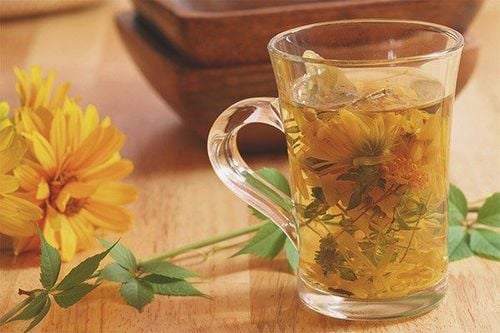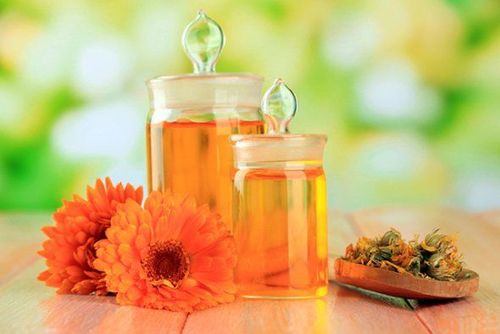This is an automatically translated article.
Calendula is a flowering plant also known as marigold, which is used medicinally, can be served as a tea or used as an ingredient in various herbal recipes. While tea is made by steeping the flowers in boiling water, the extract is derived from both the flowers and leaves.1. Overview
Calendula flowers are commonly used for wounds, rashes, infections, inflammation, and many other conditions. However, there is no strong evidence to support the use of calendars for these uses.Do not confuse calendula with ornamental marigolds of the genus Tagets, often grown in vegetable gardens. It is thought that the chemicals in calendula help new tissue grow in the wound and reduce swelling in the mouth and throat.
2. Antioxidants
Antioxidants are beneficial compounds that help neutralize the harmful effects of oxidative stress in your body.Calendula extract possesses several potent antioxidants, including triterpenoids, flavonoids, polyphenols, and carotenoids.
In addition, it has anti-inflammatory compounds, such as tumor necrosis factor alpha (TNFα). Although inflammation is a normal bodily response, chronic inflammation is associated with many conditions, including obesity, metabolic syndrome, and type 2 diabetes.
MSG is a common flavor enhancer that can cause headaches, dizziness, and numbness in sensitive individuals or when consumed in high doses.

Chiết xuất Calendula sở hữu một số chất chống oxy hóa mạnh
2. Can promote wound healing and skin ulcers
Calendula extract found in oils, ointments, and tinctures can be used topically to treat wounds and ulcers. However, it is not confirmed that drinking tea has any effect or not.Test-tube and animal studies indicate that calendula extract can regulate the expression of several proteins that promote wound healing. One test-tube study determined that calendula extract increased the amount of collagen in wounds as they healed. This protein is needed to form new skin.
In a 12-week study in 57 people, 72% of those treated with calendula extract experienced complete healing of leg vein ulcers, compared with 32% in the control group.
Similarly, in a 30-week study in 41 adults with diabetes-related foot ulcers, 78% of participants completed wound closure after daily treatment with calendula spray.
3. Can fight some cancer cells
Calendula's antioxidant content may provide anti-tumor effects. Test-tube studies suggest that the flavonoid antioxidants and triterpene calendula can fight leukemia, melanoma, colon and pancreatic cancer cells.Research indicates that the extract activates proteins that kill cancer cells while blocking other proteins that can interfere with cell death.
Calendula tea or other calendula products should never be used as a cancer treatment.
Applying calendula ointment to the skin can reduce radiculitis in people receiving radiation therapy for breast cancer. However, other early research shows that using calendula cream is no different than petroleum jelly for reducing radiculitis.
4. May have antifungal and antibacterial properties
Calendula extract is known for its antifungal and antibacterial properties. Notably, in one test-tube study, oil from calendula flowers proved effective against 23 strains of the yeast Candida, a common fungus that can cause mouth, vaginal, and skin infections.Early research shows that applying a vaginal cream containing calendula might improve burning, odor, and pain in women with bacterial vaginosis.
Another test-tube study indicates that calendula extract inhibits the growth of leishmania, the parasite that causes leishmaniasis - a disease that can produce skin sores or affect internal organs, like leaves your spleen, liver, and bone marrow. You can apply calendula oil, ointment, cloth compress, or spray directly to your skin — but keep in mind that human studies are needed, so it's unclear how effective these treatments are.

Chiết xuất Calendula được biết đến với đặc tính chống nấm và kháng khuẩn
5. May support oral health
Calendula can help treat oral conditions, such as gingivitis. Gingivitis, which is characterized by chronic gingivitis, is one of the most common oral diseases.In a 6-month study in 240 people with gingivitis, those given calendula mouthwash had a 46% reduction in their inflammation levels, compared with 35% in the control group.
Furthermore, a test-tube study determined that a calendula-based mouthwash reduced the number of microorganisms on suture material used for tooth extraction. Studies attribute these effects to calendula's potent anti-inflammatory and antibacterial properties. Furthermore, calendula tea gargle is said to relieve sore throats - although the evidence is anecdotal.
6. May improve skin health
Calendula extract is widely used in cosmetics, including creams and ointments.Both test-tube and human studies show that calendula extract can increase skin hydration and stimulate its firmness and elasticity, possibly delaying the signs of aging.
These effects may be due to its antioxidant content, which can reduce skin damage caused by oxidative stress.
Exposure to ultraviolet (UV) rays is the leading cause of oxidative stress in the skin. Interestingly, one test-tube study determined that calendula oil has a sun protection factor (SPF) of 8.36.
As such, sunscreens formulated with calendula oil can protect against sunburn. Finally, a 10-day study in 66 children with diaper rash determined that calendula ointment may act as a safe and effective treatment.

Kem chống nắng có công thức với dầu calendula có thể bảo vệ chống lại cháy nắng
7. Other uses
Many people claim that calendula has other uses, but some of these are supported by science.Can regulate the menstrual cycle. Calendula is thought to induce menstruation and relieve menstrual cramps, although supporting studies are lacking.
Can relieve nipple pain during lactation. When applied topically, calendula products can treat cracked nipples while breastfeeding. However, more research is still needed.
Can work as a face ink. Calendula is said to reduce acne and breakouts due to its antibacterial properties. However, there is no evidence to support this claim.
May promote heart health. Calendula's anti-inflammatory and antioxidant potential may reduce the risk of heart attack. However, these effects were seen in a single test-tube study using high doses.
Can relieve muscle fatigue. One study in rats found that calendula extract reduced exercise-induced muscle soreness. However, the study included extracts from two other plants, making it difficult to determine how calendula works.
Calendula may relieve pain in people with anal fissures that have not responded to treatment with sitz baths and nifedipine.
Use of calendula spray prevents infection and reduces odor in people with long-term foot ulcers caused by diabetes.
Please dial HOTLINE for more information or register for an appointment HERE. Download MyVinmec app to make appointments faster and to manage your bookings easily.
Articles refer to sources: healthline.com, webmd.com












